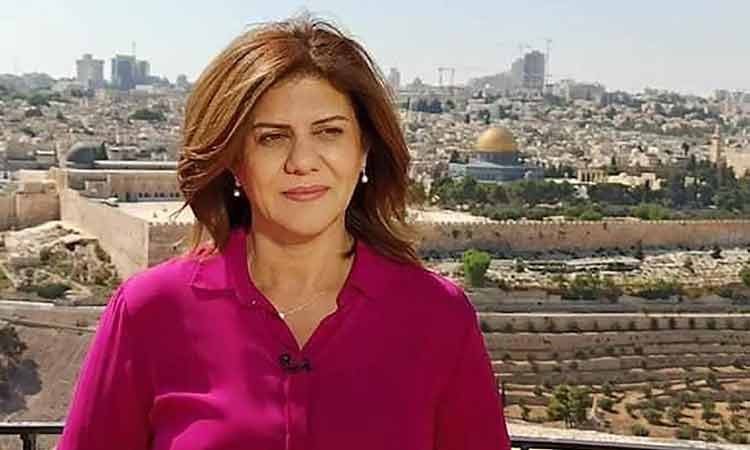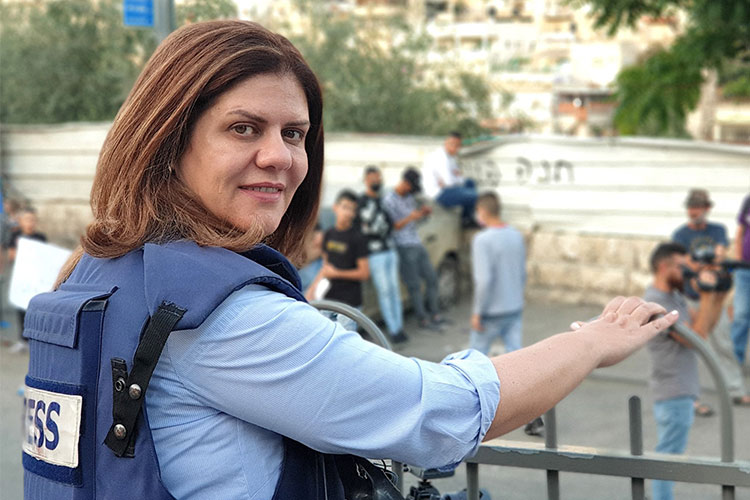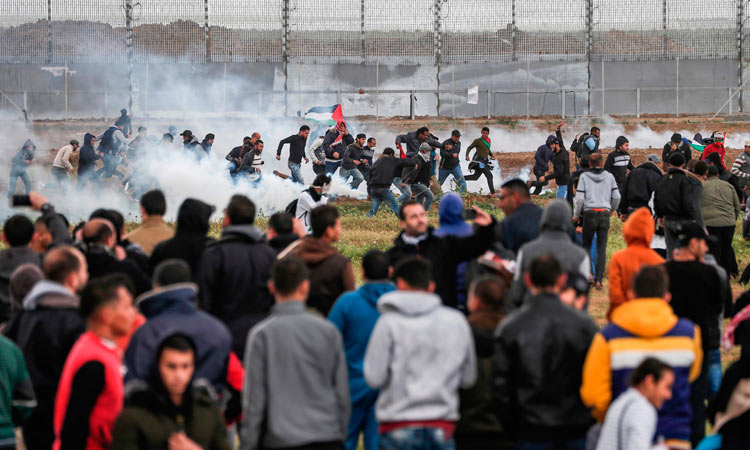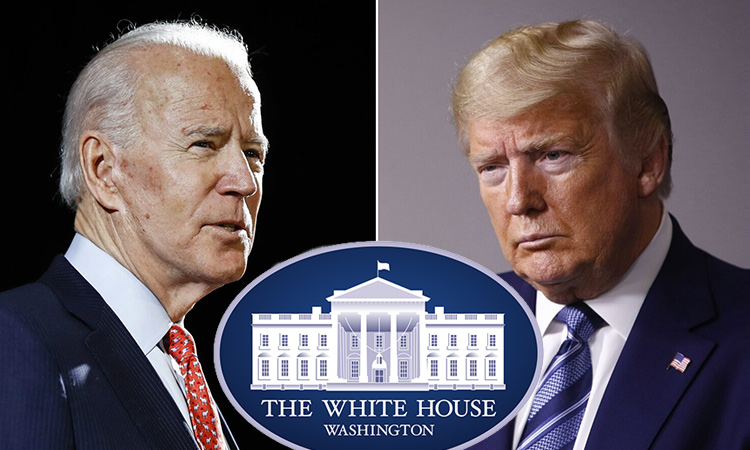A grave injustice
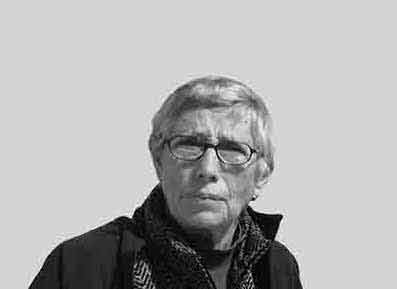
Michael Jansen
The author, a well-respected observer of Middle East affairs, has three books on the Arab-Israeli conflict.

A protester holds flowers and a poster of Al Jazeera reporter Shireen Abu Akleh during a protest outside the French hospital to denounce her killing.
Her murder in the restive West Bank town of Jenin by an Israeli sniper — whose rifle Israel seems to have identified — has become a test for the International Criminal Court (ICC). Both the Palestinian Authority and Qatar’s al-Jazeera satellite television channel, for which Abu Akleh reported, have lodged with the court criminal cases against Israelis.
The Authority has documented her May 11 killing and submitted a file to the ICC prosecutor to add her killing to cases of four other journalists, two killed and two wounded — lodged with the court in April. Al-Jazeera has also secured support from the International Federation of Journalists, the Palestinian Journalists’ Syndicate and the International Centre of Justice for Palestinians.
The Authority’s investigation appears to have been thorough and competent. Abu Akleh, 51, was struck by an armour-piercing bullet while wearing a helmet and bullet-proof vest marked with the word PRESS. Although there had been clashes when Israeli forces entered the camp, there were no Palestinian fighters at the scene and no cross-fire, as falsely claimed by Israel officials. The Israeli human rights organisation B’Tselem reported that the locations where Palestinian militants fired at Israeli troops and where Abu Akleh was filming were separated by hundreds of meters and by numerous walls and buildings. Washington Post journalists confirmed this finding.
Therefore, Israeli troops were the sole source of firing. Forensic evidence showed she was shot from behind, suggesting that she was trying to flee when Israeli forces targeted the group of journalists and continued when they turned away from the troops in order to escape. A second journalist, Ali al-Samoudi was also wounded by being shot in the back. He has been recovering in hospital.
The munition which killed Abu Akleh was identified as a 5.56mm bullet. This was likely fired from a US-made Ruger rifle which is routinely employed by Israeli forces for “crowd control.” Israel used these weapons to kill some of the 214 Palestinians, including 46 children, and more than 36,000, among them 800 children, during protests in Gaza against exile and occupation in during the 18-month long Great March of Return (2018-19), ended by Covid-19.
In 2015 the Palestinian Authority became a party to the Rome Statute which created the ICC and submitted a case on Israel’s 2014 war on Gaza. It took five years for the ICC to complete a preliminary probe into charges against Israeli troops and Hamas fighters. Although accused, Hamas, which rules Gaza, welcomed the decision while Israel refused ICC investigators access to occupied Palestine, thereby obstructing their work. The investigation was designed to cover the period from the summer of 2014 and cover the West Bank and East Jerusalem as well as the Israeli besieged and blockaded coastal strip. The ICC prosecutor promoting this case was Fatou Bensouda, a former Bambian justice minister, who served from 2012-2021.
By contrast, just four days after Russia invaded Ukraine, her successor Karim Khan proclaimed Ukraine a “crime scene,” announced investigations into possible war crimes and in mid-May dispatched 42 investigators. This was the court’s largest ever team to conduct probes into crimes falling under its jurisdiction and was, naturally, welcomed by the Ukrainian authorities.
A British lawyer specialising in human rights, Khan has represented African and Balkan leaders accused of war crimes before the ICC and headed the UN team seeking accountability for crimes committed by Da’esh in Iraq.
Al-Jazeera quoted former Palestinian Information Minister Mustafa Barghouti who accused the ICC of adopting a “double standard” in handling cases by Palestine and Ukraine. “We have been providing information for the past 13 years but [a full-scale formal] investigation has not been started yet. And, in less than two months the ICC has sent 42 investigators to Ukraine.”
Abu Akleh’s case has grabbed the attention of the international press not because she was Palestinian but due to her US citizenship, which she obtained by spending time in that country with relatives from her mother’s family. She was the fourth dual Palestinian-US citizen to be slain by Israel recently and, according to Palestinian reports, the 30th Palestinian journalist to be killed by Israel since 2000.
She attended secondary school in Beit Hanina, a suburb of East Jerusalem, before studying architecture at the Jordan University of Science and Technology but transferred to Jordan’s Yarmouk University, to earn a BA degree in print journalism. She returned to Palestine where she worked for Radio Monte Carlo and Voice of Palestine and, in 1997, joined al Jazeera as a field correspondent for the Arabic channel. In this job, she made her name during the Second Intifada (2000-2005) and the Battle of Jenin in 2002 when Israeli troops frequently fired at journalists — including this correspondent.
Her career inspired Palestinians, particularly women, and Arabs to train as journalists and she became one of the Arab world’s most prominent correspondents. Her funeral, in East Jerusalem, drew thousands of people who were horrified when Israeli troops snatched the Palestinian flag from her coffin and beat the men bearing it as her body left St. Joseph’s hospital for burial. Filmed live, this chaotic event, shocked viewers around the world and briefly broke through Ukraine’s domination of the news.
The killing of Abu Akleh and rough handling of mourners prompted the US to urge Israel to conduct a credible investigation into the shooting and the UN Security Council to adopt a rare unanimous resolution condemning her murder and demanding “an immediate, thorough, transparent and impartial investigation into her killing.”
Reporters Without Borders reported that 144 Palestinian journalists have been wounded by Israeli forces in the Gaza Strip, West Bank, and East Jerusalem since 2018. The organisation’s head Christophe Deloire called her killing as a violation of the Geneva Conventions and UN Security Council resolution 2222 on the protection of journalists. He rejected Israel’s proposal that it should take part in an investigation into her death and demanded an “independent international investigation” although Israel always rejects probes into its behaviour.
Nevertheless, the US and European Union supported this demand. CNN investigated the incident and concluded she was “shot dead in a targeted attack by Israeli forces.” This conclusion was upheld by an investigation by the Jerusalem Post, which is by no means a pro-Palestinian outlet.
Photo: TNS
